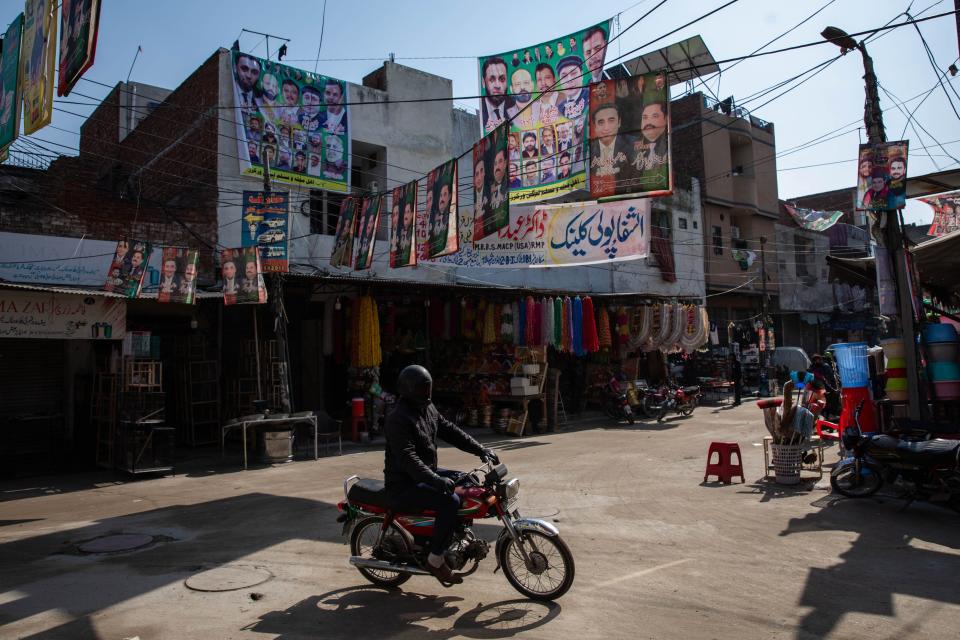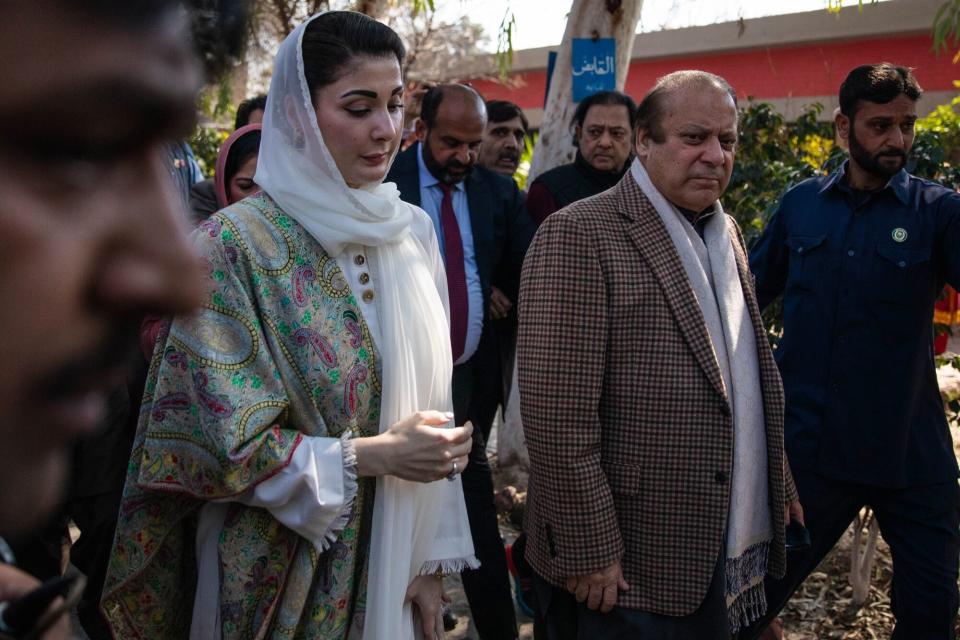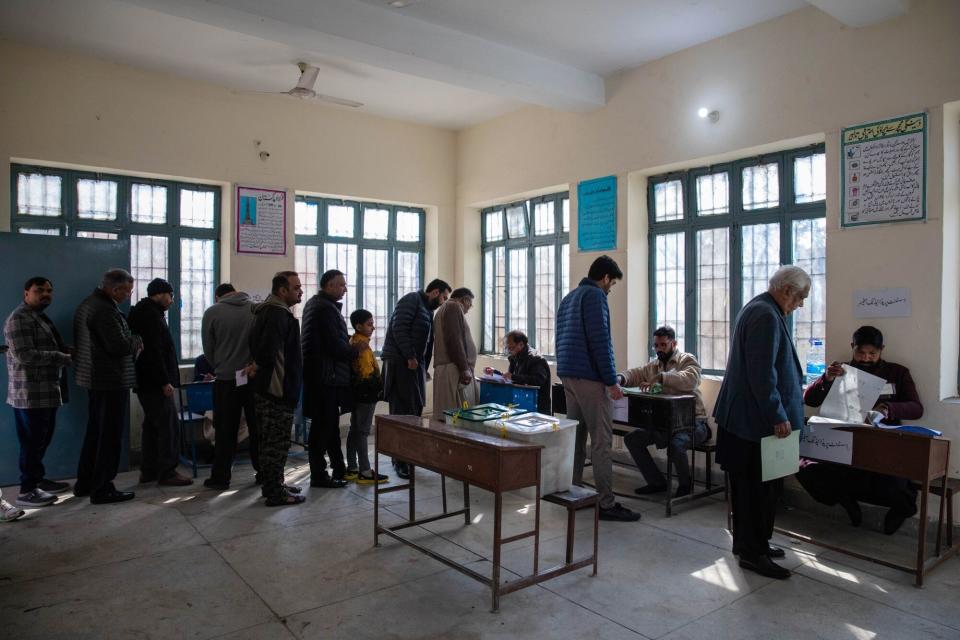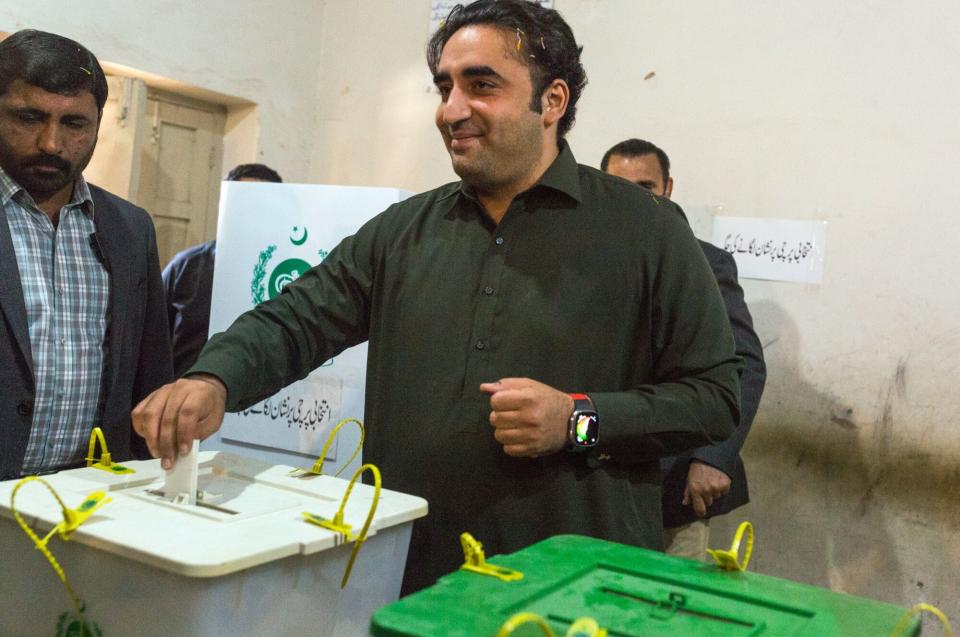Pakistan Suspends Mobile Phone Service as Voters Head to Polls
- Oops!Something went wrong.Please try again later.
- Oops!Something went wrong.Please try again later.
- Oops!Something went wrong.Please try again later.
- Oops!Something went wrong.Please try again later.
- Oops!Something went wrong.Please try again later.
(Bloomberg) -- Pakistan suspended mobile phone services as voters lined up to cast ballots in its general election Thursday, defending the measure as a way to maintain order even though critics said it would curb vital access to information during the controversial polls.
Most Read from Bloomberg
A 99% Bond Wipeout Hands Hedge Funds a Harsh Lesson on China
Einhorn Says Markets ‘Fundamentally Broken’ By Passive, Quant Investing
Bonds Fall After $25 Billion Sale as Stocks Churn: Markets Wrap
Epstein Contacted Staley for Years at Barclays Using Go-Between, Court Filings Claim
The recent surge of terrorist incidents made it necessary to “shut down mobile services nationwide temporarily to maintain the law and order situation and tackle threats,” the interior ministry said in a statement. The move comes less than 24 hours after two bomb blasts targeting the offices of different political leaders killed at least 20 people in Pakistan’s northwest Balochistan province.
The Election Commission said the suspension wouldn’t have an impact on its systems. Internet governance watchbog NetBlocks said multiple regions of the country are seeing internet blackouts. The party of jailed leader Imran Khan criticized the move, saying in a social media post on X that it was a “deliberate suppression of citizens’ rights and a mockery of democracy.”
“This is an ominous start to the election day,” Michael Kugelman, director of the South Asia Institute at the Wilson Center in Washington, said in a social media post. “Security concerns were greater in 2018 and 2013, and I don’t recall a move like this back then.”
There have been 217 militant attacks since the elections were announced in early November, according to the Pakistan Institute for Conflict and Security Studies. The South Asian nation has seen access to social media blocked multiple times in recent months as Khan’s Pakistan Tehreek-e-Insaf party did more online campaigning to dodge the authorities. Pakistan is also shutting its borders with Afghanistan and Iran for the day.
Polls close at 5 p.m. in an election where the most popular politician, Khan, has been sidelined, sent to prison on corruption and other charges. With him out of the race, the most likely politicians to lead the country are three-time former premier Nawaz Sharif, his brother, Shehbaz, or Bilawal Bhutto Zardari, the 35-year-old scion of the Bhutto dynasty.
Whoever takes power will have to fix an economy with a heavy debt load and inflation still running at 28%. The current IMF program, Pakistan’s 23rd since independence in 1947, expires in March.
The new prime minister has to navigate complex ties with the US and China, rising terrorism in Pakistan and tense relations with neighbors including India, Afghanistan and Iran. The Sharifs or Bhutto will likely be friendlier to the US than Khan, who drew closer to China during his time as premier and accused Washington of conspiring with Pakistan’s powerful military generals to oust him in April 2022.
Whoever wins will also need to work with the generals, who have ruled directly or behind the scenes for much of Pakistan’s modern history. The army, which has a strong influence over foreign policy, security and — increasingly — the economy, is widely seen by analysts as favoring Nawaz Sharif.
“Whoever comes to power will not have much role in the country’s foreign policy,” said Shaista Tabassum, dean of arts faculty and the former head of the international relations department at the University of Karachi. “Their focus will only be on domestic policies.”
Investors have been positive on Pakistan’s markets since the country clinched the nine-month IMF bailout in late June. Pakistan’s dollar bonds have rallied, gaining 9% last month and making them among the best performers in the world. They returned almost 100% in 2023. The benchmark stock index has climbed more than 50%.
S&P Global Ratings said this week a government with popular support and the ability to push through economic reforms will help Pakistan get an upgrade to a B rating from CCC+ and give it a better chance of securing more financing from the IMF.
Top business leaders and political commentators say the most likely election outcome is a hung parliament and a coalition government. There are 266 directly contested seats up for grabs in the National Assembly, Pakistan’s lower house, meaning a party or coalition would need 134 seats to form a majority. Any party that wins about 90 seats would be in the driving seat to begin negotiations to head a government, analysts say.
A Gallup Pakistan survey published in January showed Nawaz Sharif gaining ground on Khan, who received three new jail sentences recently. Sharif returned from exile last year under a deal that analysts said was probably approved by the military. He pledges to boost infrastructure spending and cut inflation, which is running at the fastest pace in Asia.
Bhutto is banking on his relative youth and family history to draw voters in a country where people aged 18 to 35 account for more than 40% of the electorate. Both his mother, Benazir Bhutto, and grandfather, Zulfikar Ali Bhutto, served as prime minister. Benazir was assassinated while Zulfikar was executed after a military coup.
Khan’s party is backing more than 200 independent candidates after the authorities prevented the party from fielding them under its name and took away its coveted cricket bat symbol, which had helped illiterate voters choose them in the past. It’s unclear what will happen if they win a large number of seats.
Whoever comes to power will be keenly aware that they can also fall out of favor with a military that analysts say is increasingly assertive behind the scenes. No prime minister has ever completed a full five-year term in Pakistan’s 77-year history.
“All the last prime ministers thought they were in charge until they got kicked out,” said Ahmad Yunas Samad, a professor of political science at Lahore University of Management Sciences.
--With assistance from Faseeh Mangi, Khalid Qayum, Akriti Sharma, Niluksi Koswanage and Tom Redmond.
(Updates throughout)
Most Read from Bloomberg Businessweek
How Jack Dorsey’s Plan to Get Elon Musk to Save Twitter Went South
OpenAI’s Secret Weapon Is Sam Altman’s 33-Year-Old Lieutenant
A Tiny Fund Takes a Big Short on Corporate Debt Maturity Wall
©2024 Bloomberg L.P.





